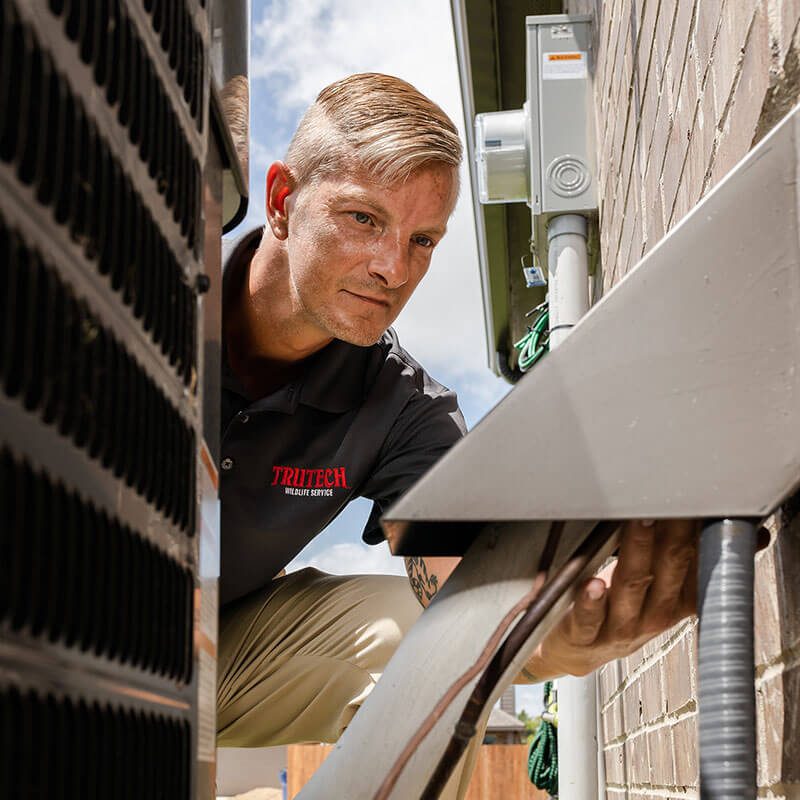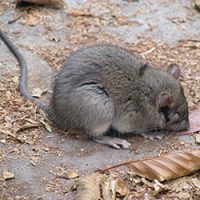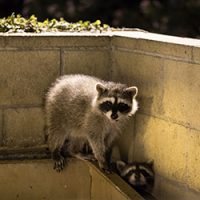Atlanta Wildlife Removal
Wildlife We Remove in Atlanta, GA
When it comes to wildlife removal in metro Atlanta, you want the most effective and safest method possible, which is why you’ll want to call Trutech.
There is no one-size-fits-all solution; each job requires a custom approach. We inspect every home and build a custom plan to resolve any wildlife problems.
Our Integrated Wildlife and Pest Control programs aim to humanely remove and prevent any future intrusions. We provide full home exclusions in which we repair and restore your home from the damage caused by the animal(s).
Common Wildlife
Atlanta Wildlife Removal Services
The best time to call a wildlife removal company in Atlanta is at the first signs of nuisance wildlife.
While an animal is left unattended in your attic, crawlspace, basement, or in your walls, they are damaging your home and ruining your quality of life.
Before you set a trap to catch wildlife in your home, ask yourself:
- Do you have the proper licensing to perform animal removal?
- Do you know how to properly dispose of an animal carcass?
- Do you know how to release a trapped animal?
- Do you know what bait should be used to ensure you catch the targeted species?
- Do you know how frequently you must check a trap set to capture wildlife?

Wildlife problem? Let us take care of it
Common Wildlife in Atlanta
Raccoon
Raccoons inhabit all parts of the state, tend to stay near a reliable source of water, and are comfortable in urban areas. Raccoons can wreak havoc trying to gain entry to your home and cause significant damage creating a den in your attic. They can cause a mess of garbage and destroy home gardens and birdfeeders. Because they are nocturnal, you’ll most likely hear a loud thumbing at night if you have an attic.
Female raccoons will seek out shelter during the breeding season. The breeding season peaks in February and March but can happen anytime between December and June. Raccoons are nocturnal, but a female will be active during the day to forage for food if she has a litter.
Live trapping is the most common removal technique and exclusion techniques include securing food sources and closing any entry points.
Squirrel
Squirrels breed twice a year in Atlanta. Once in late winter, and once in late summer. They will nest in attics and vents if they’re able to access the home. You’re most likely to hear a squirrel family in your home in early spring and early fall.
Squirrels are active during the day so you might hear squealing, running, or gnawing early in the morning. Squirrels’ teeth never stop growing so they constantly gnaw and chew damaging attic insulation, fraying electrical wire, and destroying house structures.
Squirrels can impact your quality of life. They are active from dawn to dusk. The most common sign of squirrels is the sound of scurrying early in the morning.
To effectively remove squirrels, the wildlife technician will employ a variety of tactics such as live trapping, one-way doors, deterrents, and direct capture.
Bat
Georgia is home to sixteen bat species, but the little or big brown bats are most common in Atlanta homes. These local species gather in large colonies in attics and barns to roost. Bat maternity season lasts from April 1st to July 31st. During this time only certified Nuisance Wildlife Control Operators can remove bats on account of flightless pups.
Bats in the attic, or elsewhere in your home, can be a particularly troublesome nuisance. Not only do they make a lot of noise, but their nests and droppings can negatively affect your health and the health of your family.
Bat guano is the surest sign you have bats and the greatest risk to your health. A large accumulation of guano can lead to structural issues and spread two fungal diseases.
Who We Are
When you encounter unwanted wildlife in your home or business it is important to resolve the problem quickly and professionally. At Trutech®, our expert technicians and specialists have over 100 years of combined experience in the wildlife removal industry.
We know how to protect you and your family from the hazards of wildlife in your home or place of business.


Frequently Asked Questions
There is no one-size-fits-all solution; each job requires a custom approach. We inspect every home and build a custom plan to resolve any wildlife problems. We use a variety of techniques including cage traps, direct capture, one-way valves, and deterrents. Exclusion techniques are the most effective way to get rid of animals.
We provide customized solutions to each individual customer so that we may solve the issue as quickly, efficiently, and cost-effectively as possible. The size of the house, type of animal, number of nuisance animals, and length of time of infestation affect the estimated price of wildlife removal.
An estimate may change based on the amount of animal activity or work needed to be done. All estimates are finalized with an exact price before any work begins.
Our goal is to remove any wildlife as humanely as possible — often that means catching and releasing the animal.
Trutech® does not hire subcontractors for animal removal services. We employ expert technicians who are provided ongoing education and training in all aspects of animal control and removal. Many of our technicians hold degrees in Wildlife Biology, Entomology (insects), Ornithology (birds) or Herpetology (reptiles), some with Masters degrees in their specialty field.
Yes! We are licensed and insured.
We start by first removing the wildlife on your property, and cleaning up any damage. From there we’ll work with you to create a customized prevention plan so you won’t have the same issue again.
Typically an animal dies in your home because it became trapped in a hard-to-reach and hidden area. Our expert technicians have the experience and knowledge to find it and then safely remove the carcass from your home.
Our Wildlife Technicians use a pet-safe odor eliminator made of natural organisms and enzymes that consume decaying organic odor-causing matter, eliminating the source of the lingering odor. We use aerosols, oxidizing agents, foggers, and disinfectants with germicides to deodorize until nature completes this task for you.
You should consider a full home exclusion after the smell has been neutralized. Nuisance wildlife found its way into your house once. That entrance leaves your home vulnerable to future animal infestations. Full home exclusions are the most effective form of wildlife control.








